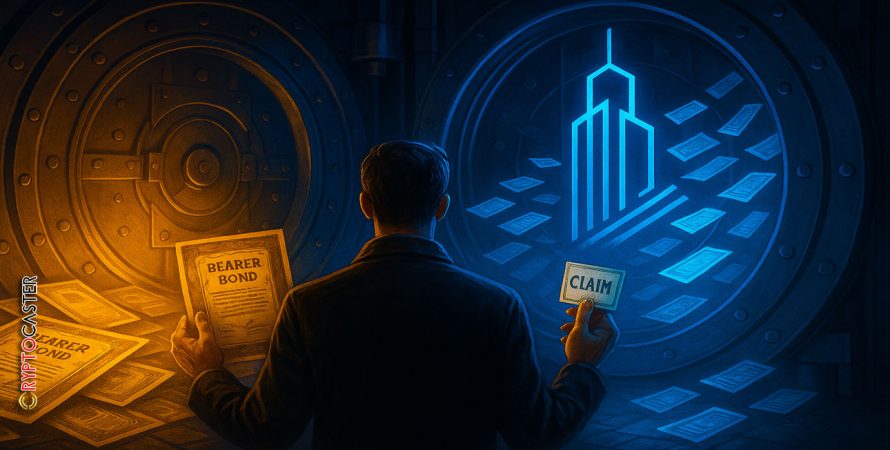By CryptoCaster Investigations – Financial Plumbing Series | October 4, 2025
Peeling back the layers of financial plumbing to expose how markets really work — and what crypto investors must learn before it’s too late.
Do you really own the assets in your portfolio — or do you only hold a claim ticket? For most investors, stocks, bonds, and even ETFs are not registered in their own name but in what Wall Street calls “street name.” This invisible layer of financial plumbing makes modern markets possible. But it also creates risks, blind spots, and control issues that CryptoCaster readers need to understand — especially as crypto and tokenized assets start to mirror the same practices.
Stay in the know on crypto by frequently visiting Crypto News Today
What is “Street Name”?
At its core, “street name” means your securities are officially registered in the name of your broker, bank, or clearing house rather than in your own name.
- You are the beneficial owner — entitled to profits, dividends, and voting rights.
- The broker or clearing entity is the registered owner — listed on the issuer’s official books.
This setup took hold in the late 20th century, when paper certificates were replaced with centralized depositories like the Depository Trust Company (DTC) in the U.S. and Euroclear in Europe. Without it, today’s high-speed markets wouldn’t exist.
CryptoCaster Quick Check:
Why the System Exists
Street name registration evolved to solve practical problems:
- Speed: Settlement accelerated from weeks to T+1.
- Liquidity: Shares can be sold instantly without mailing certificates.
- Cost: Eliminates the need for paper and manual record-keeping.
- Flexibility: Enables margin accounts, options, and short-selling.
In short, street name is the grease that keeps capital markets moving.
How Assets Get Reassigned
Once you grasp the structure, you can see how assets are constantly reassigned within the system:
- Clearing Operations – Every trade updates balances between brokers at the clearing house, not individual certificates.
- Corporate Actions – Splits, dividends, or mergers automatically reassign holdings into new forms.
- Securities Lending – In margin accounts, brokers can lend your shares to short sellers.
- Broker Insolvency – If a broker fails, trustees transfer client claims to another custodian, but not always smoothly.
For investors, this means your ownership is mediated by contracts and records — not by direct title.
The Risks & Vulnerabilities
While efficient, this system carries hidden risks:
- Voting dilution: Investors only vote by proxy through their broker; not all votes are transmitted.
- Custodial risk: If a broker mismanages accounts (see MF Global), assets may be tied up.
- Opacity: Retail investors rarely know if their shares are being lent out.
- Systemic leverage: Securities lending adds hidden fragility.
In a crisis, beneficial owners can find themselves at the back of the line while legal title holders (the clearing system) keep control.
Case Studies: When Street Name Became Center Stage
- GameStop (2021–2023): Retail activists pushed Direct Registration (DRS) via Computershare to force shares out of lending pools, disrupting short-selling.
- MF Global Collapse (2011): Misuse of client accounts left billions “missing,” highlighting custodial risk.
- Archegos (2021): Synthetic exposures built on street name holdings triggered systemic losses.
- FTX (2022): Crypto’s own “street name” problem — assets held in custody, re-hypothecated without transparency.
Each example underlines the same truth: when your name isn’t on the register, you rely on institutions to honor your claim.
Bearer Bonds: The Opposite Extreme
To understand street name fully, it helps to look at the financial relic of bearer bonds — once common, now nearly extinct.
- Bearer bonds made the holder the legal owner, with no registry at all. Whoever physically held the paper owned the bond and could clip coupons for interest.
- They offered total anonymity and control, bypassing brokers and clearing houses.
- But they also came with huge risks: theft, loss, and abuse for money laundering.
Governments phased them out in the 1980s–90s due to fraud and tax evasion.
This sets up a powerful contrast:
- Street name: hyper-centralized ownership, efficient but indirect.
- Bearer bond: totally decentralized ownership, absolute but dangerous.
The connection to crypto custody is direct:
- Bearer bond ≈ self-custody/private keys (your control, your risk).
- Street name ≈ custodial exchange wallets (convenient, but dependent on intermediaries).
The DRS Alternative
Direct Registration Systems (DRS) allow investors to bypass brokers and register shares directly with issuers.
- Pros: Full ownership, no rehypothecation, no proxy dilution.
- Cons: Slower sales, less flexibility, harder to use in active trading.
This is why DRS has gained traction among activist investors and certain retail communities.
Global Perspective
- U.S.: Nearly all securities are funneled through DTCC’s Cede & Co.
- Europe: Euroclear and Clearstream dominate.
- South Africa: Strate manages equity settlement.
- Trendline: Tokenization may bypass “street name” entirely, putting assets directly on blockchain ledgers.
Why CryptoCaster Readers Should Care
For digital asset investors, the parallels are unmistakable:
- Street name ≈ Custodial wallets
- Bearer bonds ≈ Private keys/self-custody
- DRS ≈ Hybrid — direct ownership with system guardrails
Understanding these ownership models is essential. Whether you’re in equities or crypto, the real question is the same: Do you own the asset, or just a claim ticket?
Closing
Street name registration is not just jargon. It’s the foundation of modern market structure — efficient but fragile, enabling liquidity while obscuring ownership. Bearer bonds remind us of the opposite extreme: direct possession, but at high personal risk.
As crypto and tokenization evolve, these lessons echo louder than ever. For investors moving between TradFi and Web3, this is a marker of power and risk you cannot afford to ignore.
CryptoCaster will continue to shine a light on these financial plumbing systems, helping you navigate the hidden architecture beneath your portfolio.
📌 Series Footer
This article is part of CryptoCaster’s Financial Plumbing Series, an investigative look at the hidden systems of global finance and their crypto parallels. From clearing houses and collateral chains to tokenization and sovereignty, we peel back the layers so you can see how markets really work — and what’s coming next.
👉 Follow CryptoCaster for the next installment of the series and other deep-dive investigations into digital assets, regulation, and financial sovereignty.
If this article brought you clarity, insight, or value—support the work that made it possible.
At CryptoCaster, we report on Web3, crypto markets, and institutional finance with no billionaire owners, no shareholders, and no hidden agenda. While mainstream media bends toward Elon Musk, BlackRock, and JPMorgan narratives, we stay focused on what matters: truth, transparency, and the public interest.
We don’t just cover the headlines—we investigate the power structures behind them. From FTX and Ripple to the quiet push for CBDCs, we bring fearless reporting that isn’t filtered by corporate interests.
CryptoCaster is 100% paywall-free. Always has been. To keep it that way, we depend on readers like you.
If you believe independent crypto journalism matters, please contribute—starting at just $1 in Bitcoin or Ether. Wallet addresses are below.
Your support keeps us free, bold, and accountable to no one but you.
Thank you,
Kristin Steinbeck
Editor, CryptoCaster
Support CryptoCaster: The Unfolding of Money
At CryptoCaster.world, we’re dedicated to bold journalism, sharp insights, and fearless commentary across blockchain, Web3, and crypto markets. Your **Bitcoin contributions** help us stay independent and continue delivering signal over noise.
🚨 CryptoCaster does not offer investment advice. Always DYOR—volatility is real, and risk tolerance matters.
Support our mission. Contribute BTC today.
🔗 Bitcoin Address:
3NM7AAdxxaJ7jUhZ2nyfgcheWkrquvCzRm
Thank you for backing our journalistic lens as we chronicle the Unfolding of Money — a saga still being written in real time.![]()
CRYPTOCASTER HEATMAP








